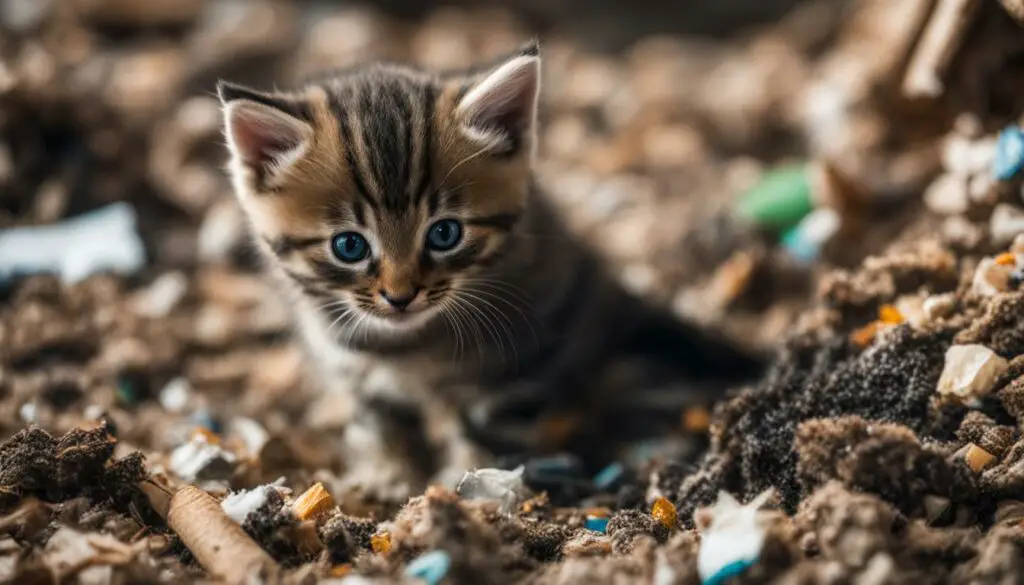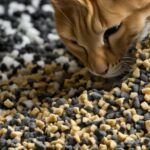Welcome to my blog, where I’ll help you understand why your adorable 4-week-old kitten is eating litter. As a cat lover and expert, I know that this behavior can be concerning. But fear not! I’m here to shed some light on the matter and guide you through the steps to ensure your little furball stays safe and healthy.
Key Takeaways:
- Curiosity and potential health issues can lead kittens to eat litter.
- Eating litter may indicate a condition called pica, which requires veterinary attention.
- Risks of eating clumping litter include bowel obstruction.
- Pica can be caused by anemia, dietary deficiencies, parasites, or other health conditions.
- Addressing curiosity-driven litter eating involves using non-clumping litter, monitoring closely, and providing safe alternatives.
Reasons for Kittens Eating Litter
There are a few reasons why kittens may exhibit the behavior of eating litter. One common reason is curiosity. Kittens are naturally curious creatures, and they use their mouth to explore their environment. This includes tasting different objects, such as litter, to satisfy their curiosity. It is important to monitor this behavior closely to ensure they don’t consume excessive amounts of litter, which can be harmful to their health.
Another reason for kittens eating litter is a condition called pica. Pica is a symptom rather than an answer, indicating that there may be an underlying issue. It can be a sign that the kitten is feeling unwell or deficient in a vital nutrient. While eating litter in itself doesn’t indicate the specific illness or deficiency, it is a signal that a veterinarian should be consulted to determine the cause of the pica behavior.
To better understand the reasons behind a kitten eating litter, it is crucial to consult a veterinarian. They can assess the kitten’s overall health and conduct any necessary tests to determine if there are any underlying medical conditions or deficiencies contributing to the behavior. Veterinary guidance is essential in addressing the root cause of the litter-eating behavior and ensuring the well-being of the kitten.
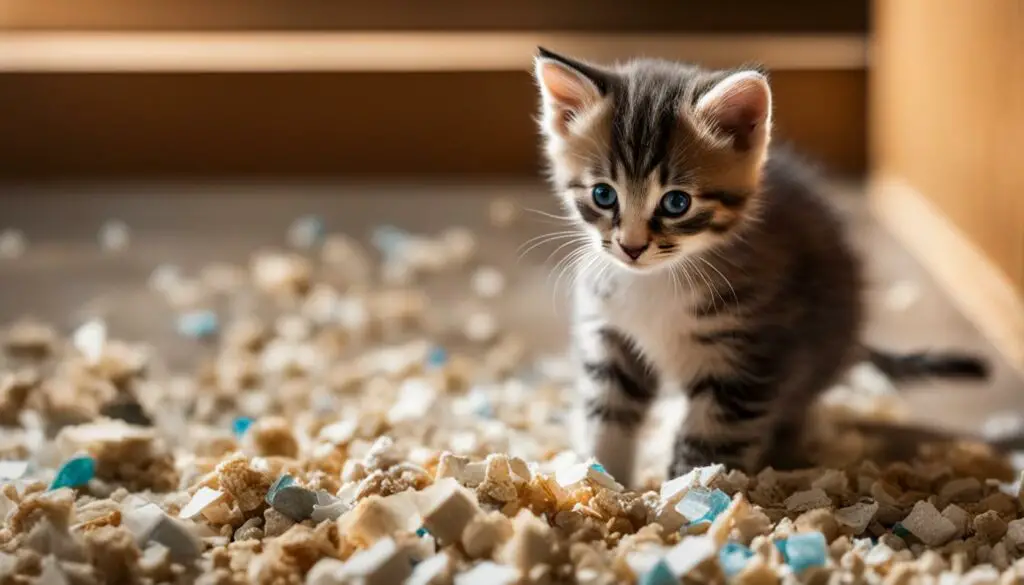
Differences Between Curiosity and Pica
| Curiosity | Pica |
|---|---|
| Normal exploratory behavior | Can indicate an underlying issue |
| May resolve on its own | Requires veterinary consultation |
| Can be managed through supervision and redirection | Treatment depends on addressing the underlying cause |
Risks of Kittens Eating Litter
Eating litter may seem like a harmless behavior for kittens, but it can actually pose serious risks to their health. One of the main dangers associated with litter consumption is the use of clumping cat litter. Clumping litter is designed to absorb moisture and form solid clumps, which can be extremely dangerous if ingested by a kitten.
When a kitten consumes clumping litter, it can swell and stick together in their digestive system, leading to bowel obstruction. This can cause severe discomfort, pain, and potentially life-threatening complications. It is important to be aware of the symptoms of a gut blockage, which may include vomiting, poor appetite, weakness, and dehydration.
To minimize the risks of litter consumption, it is crucial to avoid using clumping cat litter for 4-week-old kittens. Instead, opt for a non-clumping option that is safe for them to ingest if they do happen to eat it. By making this simple switch, you can help protect your kitten from the dangers of clumping litter and reduce the likelihood of digestive problems.
| Dangers of Kittens Eating Litter | Preventive Measures |
|---|---|
| Bowel obstruction | Avoid clumping cat litter |
| Vomiting | Monitor your kitten closely |
| Poor appetite | Provide a safe alternative for exploration |
| Weakness | Ensure a balanced diet |
| Dehydration | Regular veterinary check-ups |
By being aware of the risks associated with kittens eating litter and taking preventive measures, you can help ensure the well-being of your furry friend and provide them with a safe environment to explore and grow in.
Common Causes of Pica in Cats
When it comes to pica in cats, including kittens, there are several common underlying causes that can contribute to this behavior. One possible cause is anemia, which occurs when there is a lack of red blood cells in the body. Anemia in cats can be caused by various factors such as blood parasites or dietary deficiencies. Kittens that are not getting the proper nutrients they need may develop pica as a way to compensate for these deficiencies.
Other potential causes of pica in cats include worms or internal parasites, kidney disease, and bone marrow problems. While it is less likely for a 4-week-old kitten to have kidney disease, it is important to consider these potential causes and consult a veterinarian if necessary. Identifying and addressing the underlying cause of pica is crucial in order to effectively manage and treat this behavior.
Possible Causes of Pica in Cats:
- Anemia
- Dietary deficiencies
- Worms or internal parasites
- Kidney disease
- Bone marrow problems
If you notice that your kitten is exhibiting pica behavior, it is important to seek veterinary guidance. A veterinarian can help determine the underlying cause of pica and provide the appropriate treatment to address the issue. By addressing the underlying cause, you can help prevent further complications and promote the overall health and well-being of your kitten.
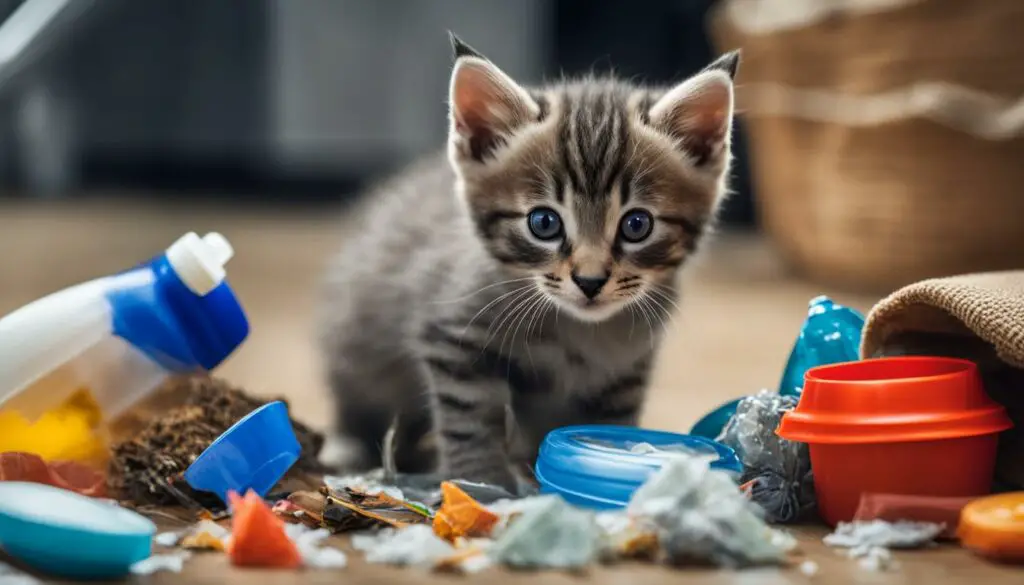
| Possible Causes of Pica in Cats | Description |
|---|---|
| Anemia | A lack of red blood cells in the body, caused by factors like blood parasites or dietary deficiencies. |
| Dietary deficiencies | A lack of essential nutrients in the diet, leading to a craving for non-food items. |
| Worms or internal parasites | Presence of worms or parasites in the digestive system, causing a disruption in normal eating behavior. |
| Kidney disease | A condition affecting the kidneys, which can lead to changes in appetite and eating behavior. |
| Bone marrow problems | Issues with the production of blood cells in the bone marrow, leading to abnormal eating behaviors. |
Addressing Curiosity-Driven Litter Eating
If your 4-week-old kitten is eating litter out of curiosity, there are steps you can take to address this behavior and ensure their safety. One effective approach is to switch to non-clumping cat litter, as it reduces the risks of complications. Non-clumping litter is safer for kittens, as it doesn’t swell or stick together in their digestive system.
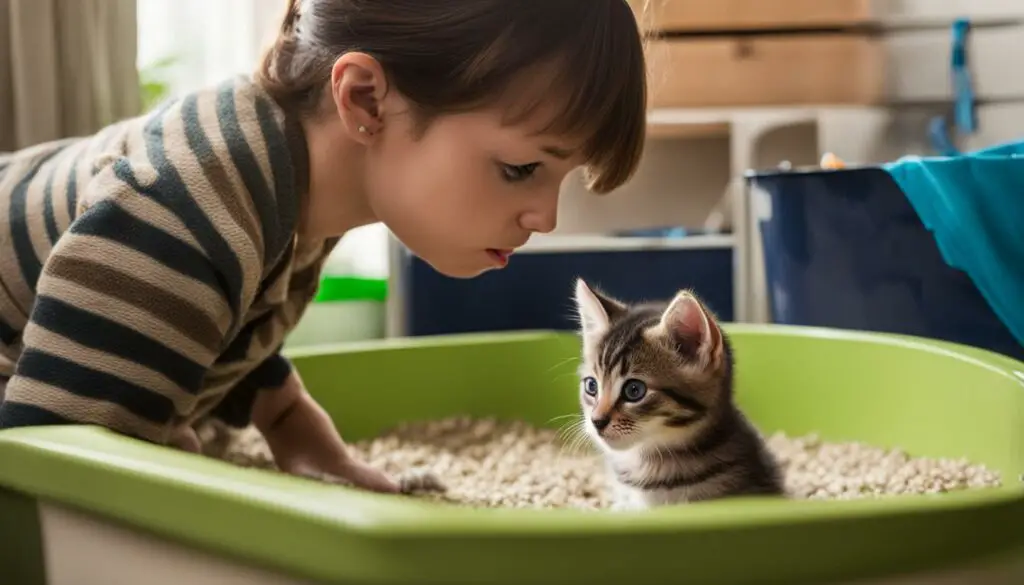
Additionally, closely monitor your kitten during litter box usage and promptly remove them from the litter box if they attempt to eat the litter. Providing alternative sources of exploration and play can also help distract them from the curiosity-driven litter eating habit. Engaging toys, scratching posts, and interactive play sessions can keep them entertained and provide a healthy outlet for their natural curiosity.
Ensuring a balanced diet for your kitten is crucial as well. Consult with your veterinarian to ensure that their nutritional needs are being met. Regular veterinary check-ups are important to monitor their overall health and address any concerns promptly.
Identifying and Treating Pica in Kittens
If your 4-week-old kitten is exhibiting litter-eating behavior, it is important to identify and treat the underlying cause. One possible cause of this behavior is anemia, which is a condition characterized by a lack of red blood cells. Anemia can be caused by factors such as blood parasites or dietary deficiencies, and it can lead to pica in cats. To determine if anemia is the cause, a veterinarian may perform blood tests to assess the kitten’s red blood cell count and iron levels.
In addition to addressing anemia, it is crucial to review the kitten’s diet to ensure it is nutritionally balanced and meets their specific needs. Providing a high-quality kitten food that is rich in essential nutrients can help prevent nutritional deficiencies that may contribute to pica. The veterinarian may recommend supplements or dietary modifications to address any deficiencies that are identified.
Furthermore, treating any underlying health conditions or parasites is essential to effectively address the pica behavior. Anemia in cats can be treated through medication, such as iron supplements or medications to address the underlying cause. In cases where anemia is severe, blood transfusions may be necessary. Additionally, if internal parasites are contributing to the pica behavior, deworming medications can be prescribed to eliminate the parasites and alleviate the symptoms.
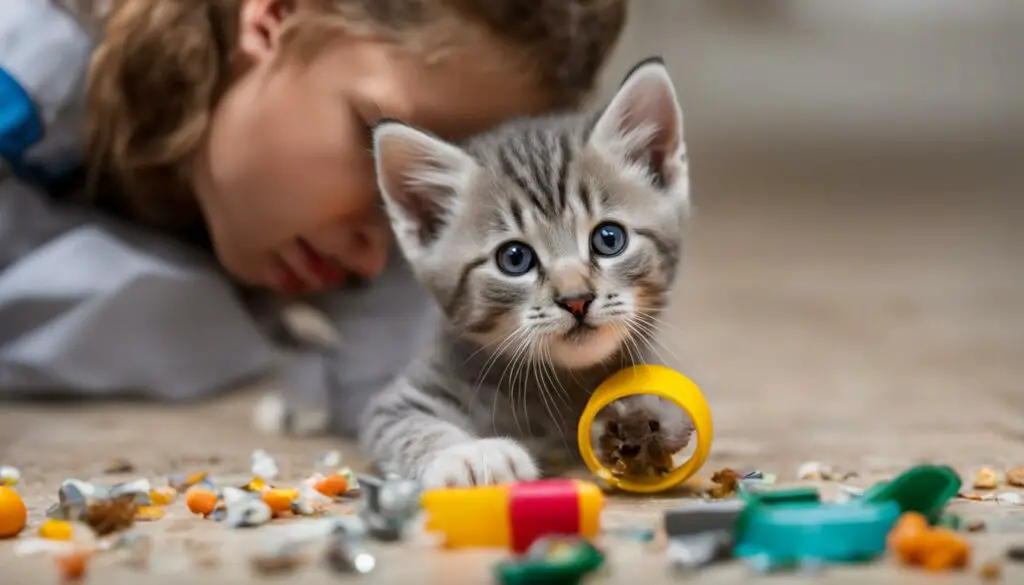
Managing Pica Behavior
In addition to addressing the underlying cause, it is important to manage the pica behavior in kittens. Minimizing the kitten’s access to non-food items, including litter, can help prevent further episodes of pica. This may involve keeping the kitten in a secure and supervised environment, removing potential hazards or temptations from their surroundings, and providing safe alternatives for exploration and chewing.
Regular veterinary check-ups are essential to monitor the kitten’s progress and adjust the treatment plan as necessary. The veterinarian can provide guidance on managing the pica behavior and offer additional strategies to discourage the kitten from eating inappropriate substances. With proper identification, treatment, and management, the pica behavior can be effectively addressed, ensuring the health and well-being of the kitten.
| Key Steps for Identifying and Treating Pica in Kittens |
|---|
| 1. Consult with a veterinarian to determine the underlying cause, such as anemia or other health conditions. |
| 2. Review the kitten’s diet and ensure it is nutritionally balanced. |
| 3. Treat any underlying health conditions or parasites that may be contributing to the pica behavior. |
| 4. Minimize the kitten’s access to non-food items and provide safe alternatives for exploration and chewing. |
| 5. Attend regular veterinary check-ups to monitor progress and adjust the treatment plan if necessary. |
The Importance of Veterinary Consultation
When it comes to a kitten eating litter, seeking veterinary consultation is of utmost importance. While some instances of litter-eating may be harmless, it can also be a sign of underlying health issues or nutritional deficiencies. As a responsible pet owner, it is essential to have a veterinarian assess the kitten’s overall health and determine if further investigation or treatment is necessary. Trusting a professional opinion can provide peace of mind and ensure the well-being of your furry friend.
Signs of Ill Health in Kittens
Recognizing signs of ill health in kittens is crucial in determining the urgency of veterinary consultation. Pay close attention to any changes in appetite, weight loss, weakness, or dehydration. These can be indications of an underlying health problem that needs immediate attention. Additionally, monitor for other signs such as changes in behavior, unexplained lethargy, or abnormal bathroom habits. Trust your instincts and consult a veterinarian if you have concerns about your kitten’s health.
The expertise of a veterinarian is invaluable, especially when it comes to diagnosing and treating potential health issues related to litter-eating behavior. A thorough examination can help identify any underlying conditions that may be causing the behavior and determine the most appropriate course of action. Early intervention can prevent complications and ensure the well-being of your kitten.
| Signs of Ill Health in Kittens | Reason for Veterinary Consultation |
|---|---|
| Loss of appetite | Indicates potential health problem or nutritional deficiency |
| Weight loss | May be a sign of underlying health issues or malnutrition |
| Weakness or lethargy | Could signify an underlying illness or lack of essential nutrients |
| Dehydration | Indicates potential health problems or lack of proper hydration |
Remember, the well-being of your kitten should always be a top priority. Veterinary consultation is paramount in ensuring their health and addressing any concerns you may have. By seeking professional guidance, you can effectively understand and address the reasons behind the litter-eating behavior, providing the best care for your furry companion.
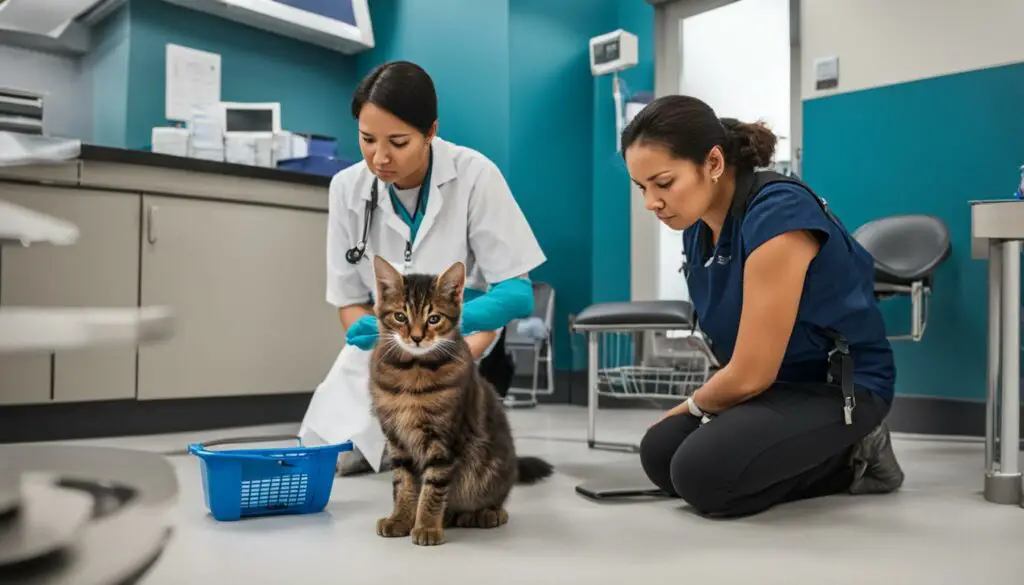
Litter Training Tips for Young Kittens
When it comes to litter training young kittens, there are a few important tips to keep in mind. By following these guidelines, you can help establish proper litter habits and minimize the risk of litter consumption:
Create a Comfortable Litter Box Environment
Make sure the litter box is clean, easily accessible, and located in a quiet area. Use a non-clumping cat litter that is safe for kittens. Providing a comfortable and inviting litter box environment will encourage your kitten to use it for their toileting needs.
Supervise Litter Box Usage
Keep a close eye on your kitten while they are using the litter box. If you notice them attempting to eat the litter, gently redirect their attention to discourage this behavior. It’s important to monitor their litter box usage to ensure they are not consuming any litter while they explore their environment.
Offer Alternative Stimulation and Play
Provide your kitten with plenty of alternative sources of stimulation and play to prevent boredom. Engage them in interactive toys, scratching posts, and play sessions to keep them mentally and physically stimulated. This can help divert their attention away from the litter box and minimize the temptation to explore and consume litter.
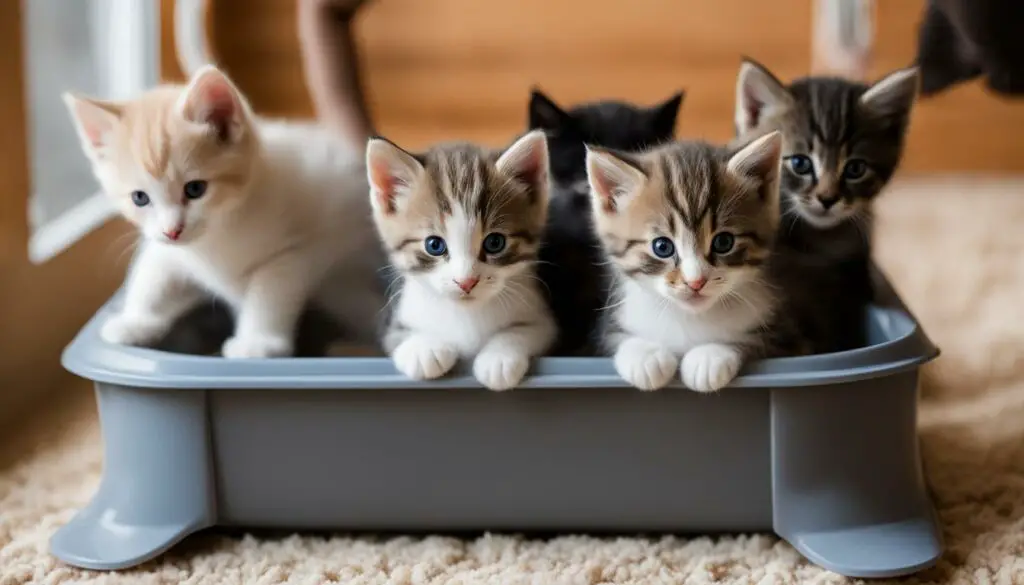
Remember, patience, consistency, and positive reinforcement are key when litter training young kittens. By creating a comfortable litter box environment, supervising their usage, and providing alternative stimulation, you can help establish proper litter habits and minimize the risk of litter consumption in 4-week-old kittens.
Preventing Litter Consumption Hazards
When it comes to 4-week-old kittens, preventing litter consumption hazards is of utmost importance. Kittens are naturally curious and may explore their environment by tasting different objects, including litter. However, ingesting litter can pose serious risks to their health. The dangers of kittens eating litter include the risk of bowel obstruction, especially if clumping cat litter is used. To ensure the safety and well-being of your kitten, here are some essential steps to prevent litter consumption hazards.
Choose the Right Litter
To minimize the risks associated with litter ingestion, opt for non-clumping cat litter instead of clumping varieties. Clumping litter can expand and stick together in the kitten’s digestive system, leading to potentially life-threatening blockages. Non-clumping litter, on the other hand, is safer and less likely to cause complications if ingested. Be sure to read the labels and choose a litter that is specifically designed for kittens.
Keep the Litter Box Clean
Maintaining a clean litter box is crucial in preventing litter consumption hazards. Regularly remove soiled litter and clean the litter box with a non-toxic cleaning solution. This not only promotes good hygiene but also reduces the chances of the kitten being attracted to any substances in the litter box. A clean litter box will also encourage the kitten to use it for its intended purpose, rather than exploring and potentially ingesting the litter.
Provide Alternative Stimulation
Kittens may be tempted to eat litter out of boredom or a lack of stimulation. To prevent this behavior, provide alternative sources of stimulation and play. Engage your kitten in interactive play sessions, provide toys and scratching posts, and create a stimulating environment with climbing structures. By keeping your kitten mentally and physically engaged, you can minimize the chances of them resorting to exploring and ingesting litter.
| Hazards | Prevention Measures |
|---|---|
| Bowel obstruction | Use non-clumping cat litter |
| Attraction to litter box substances | Maintain a clean litter box |
| Boredom and lack of stimulation | Provide alternative sources of stimulation |
By following these preventive measures, you can significantly reduce the risks associated with litter consumption in 4-week-old kittens. Remember to consult with a veterinarian if you have any concerns or if your kitten continues to exhibit litter-eating behavior. Your veterinarian can provide further guidance and ensure the overall health and well-being of your furry friend.
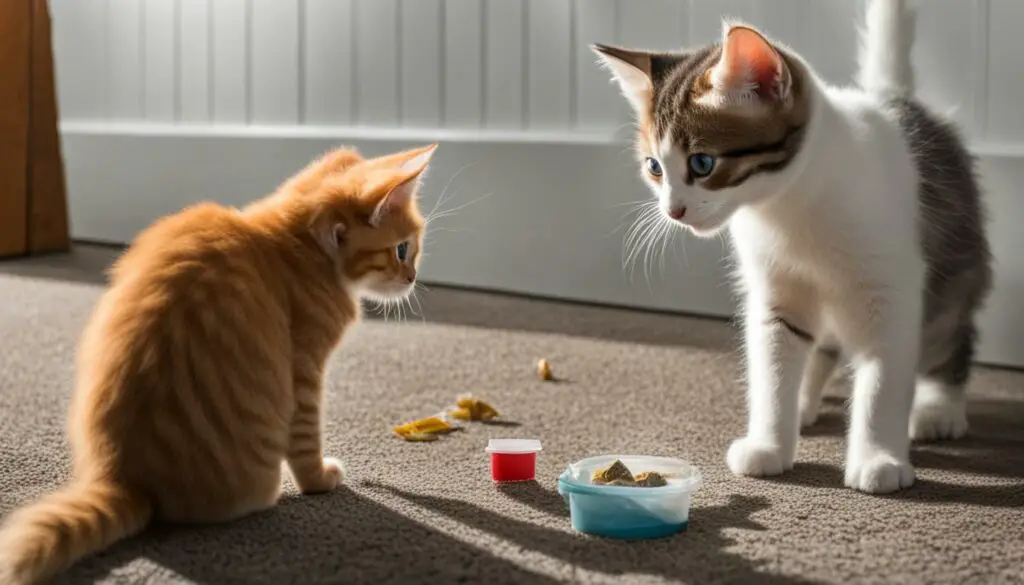
Safe Alternatives to Litter for 4 Week Old Kittens
If you are concerned about litter consumption in 4-week-old kittens, there are safe alternatives to consider. Providing litter box substitutes such as puppy pads, shredded newspaper, or specially designed litter for kittens can help minimize the risks associated with litter eating. These alternatives are easy to clean and reduce the chances of intestinal blockages. Consulting a veterinarian can provide further guidance on the most suitable options for your 4-week-old kitten.
| Litter Box Substitute | Advantages |
|---|---|
| Puppy pads | High absorbency, easy to clean |
| Shredded newspaper | Readily available, cost-effective |
| Specially designed litter for kittens | Dust-free, non-toxic, and safe |
Using puppy pads as a litter box substitute can be a convenient option as they are highly absorbent and easy to clean. This can help maintain a clean and comfortable environment for your kitten. Shredded newspaper is another alternative that is readily available and cost-effective. However, it is important to monitor your kitten closely to ensure they are not ingesting any ink or chemicals from the newspaper.
There are also specially designed litters available for kittens that are dust-free, non-toxic, and safe for ingestion. These litters are specifically formulated to minimize the risks associated with litter consumption in young kittens. Consulting a veterinarian can help you choose the most suitable litter box substitute based on your kitten’s needs and preferences.
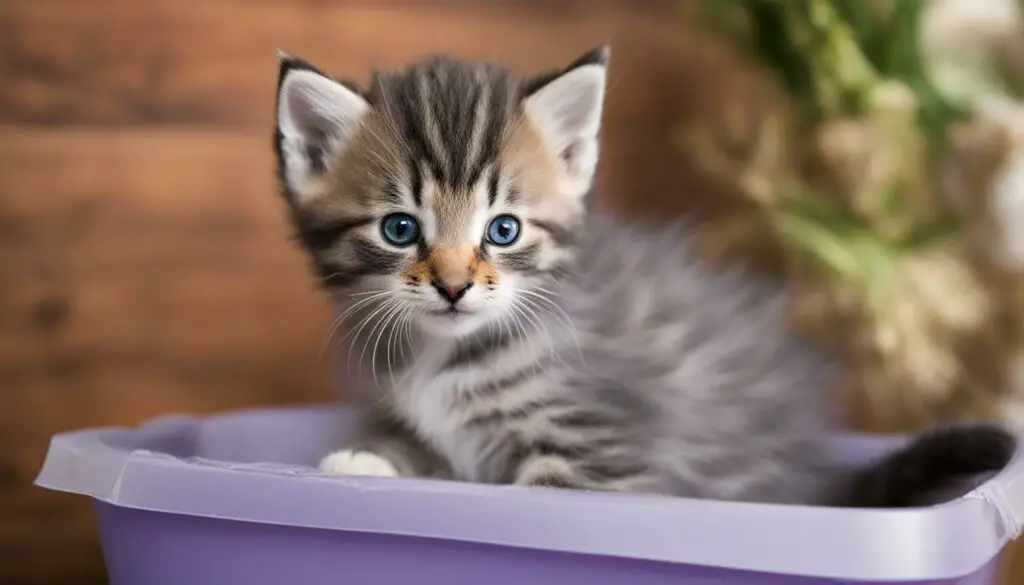
By providing safe alternatives to litter for your 4-week-old kitten, you can minimize the risks associated with litter consumption. It is important to create a clean and comfortable litter box environment to promote proper toileting habits. Regular monitoring of your kitten’s behavior and consulting a veterinarian can help ensure their overall health and well-being.
Maintaining Kitten Health and Minimizing Litter Consumption Risks
When it comes to raising a healthy and happy kitten, it’s important to address litter consumption risks and prioritize their overall well-being. By taking proactive measures and implementing proper care strategies, you can minimize the potential hazards associated with litter ingestion in 4-week-old kittens.
One key aspect of maintaining kitten health is ensuring they receive a well-balanced diet suitable for their age and nutritional needs. Consult with your veterinarian to determine the appropriate diet, which can help prevent any nutritional deficiencies that may contribute to pica behavior and litter consumption. Regular wellness check-ups and vaccinations are also important to monitor your kitten’s overall health and detect any potential issues early on.
Creating a safe and suitable litter box environment is crucial in reducing the risks of litter ingestion. Opt for non-clumping cat litter, as clumping litter can lead to bowel obstructions if ingested. Additionally, ensure the litter box is easily accessible and located in a quiet area away from food and water sources to promote a stress-free environment for your kitten.
| Risks of Litter Consumption in Kittens | Minimizing Risks of Litter Ingestion |
|---|---|
| Eating clumping litter can cause bowel obstructions | Use non-clumping cat litter |
| Curiosity-driven litter eating can indicate potential health issues | Consult a veterinarian for guidance |
| Underlying causes of pica behavior can range from anemia to dietary deficiencies | Ensure a well-balanced diet appropriate for your kitten’s specific needs |
| Proper litter box maintenance can prevent ingestion of soiled litter | Regularly clean the litter box and remove any soiled litter promptly |
By closely monitoring your kitten’s behavior, maintaining a clean litter box, and addressing any health concerns promptly, you can help minimize the risks associated with litter consumption. Remember to consult a veterinarian for personalized guidance and treatment if your kitten’s litter-eating behavior persists or is accompanied by other concerning symptoms.
Addressing Litter-Eating Behavior in Young Kittens
When it comes to addressing litter-eating behavior in young kittens, a multi-faceted approach is necessary to ensure their well-being. As a responsible pet owner, it’s essential to create a clean and comfortable litter box environment to discourage litter consumption. Avoid using clumping litter, which can pose serious risks, and opt for a non-toxic alternative. Regularly supervise your kitten during litter box usage and gently redirect their attention if they attempt to eat the litter.
Providing alternative sources of stimulation and play is also crucial. Keeping your kitten engaged and entertained with interactive toys and scratching posts can help prevent boredom, which may lead to litter exploration. Additionally, consulting a veterinarian is highly recommended to address any underlying health issues that may be causing the litter-eating behavior. A veterinarian can provide guidance on treatment options and help determine if further investigation is necessary.
To reduce litter consumption, it’s important to monitor your kitten’s behavior closely and ensure they have a balanced diet tailored to their specific needs. Regular veterinary check-ups are also essential to monitor their overall health and well-being. By taking these proactive measures and seeking professional advice, you can help address and minimize the litter-eating behavior in young kittens.
| Methods to Address Litter-Eating Behavior in Young Kittens | Benefits |
|---|---|
| Switching to non-clumping cat litter | Reduces the risk of bowel obstruction and other complications |
| Supervising kitten during litter box usage | Allows for immediate redirection if litter consumption is attempted |
| Providing alternative sources of stimulation | Prevents boredom and reduces the likelihood of litter exploration |
| Consulting a veterinarian | Allows for professional guidance and treatment options |
| Monitoring behavior and ensuring a balanced diet | Addresses any underlying health issues and promotes overall well-being |
Expert Tip:
By taking proactive steps to address litter-eating behavior in young kittens, you can create a safe and healthy environment for their growth and development. Remember to closely monitor their behavior, provide appropriate alternatives, and consult a veterinarian if needed.”
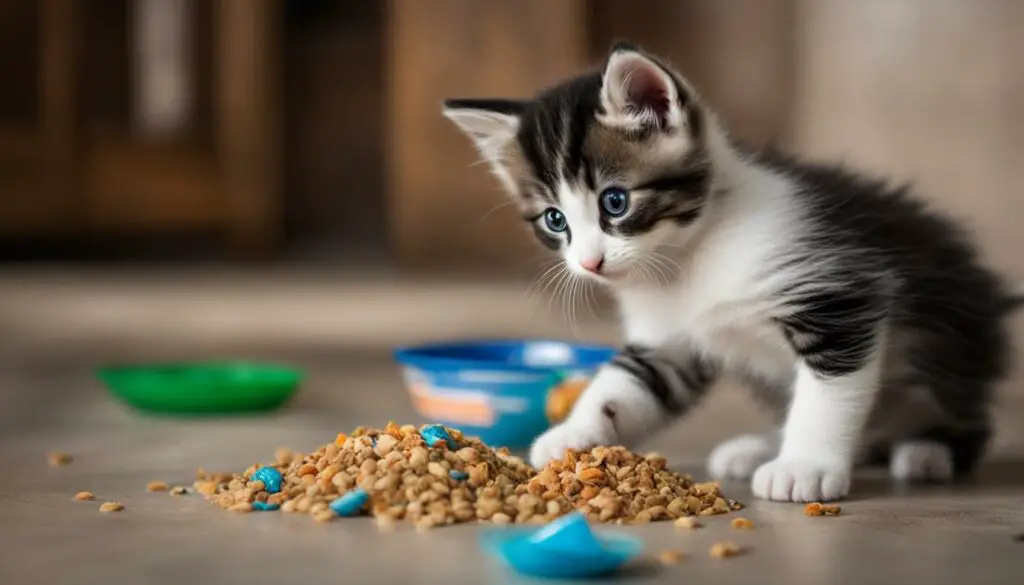
By following these recommendations and implementing proper strategies, you can effectively address litter-eating behavior and reduce litter consumption in young kittens. By understanding the potential reasons behind this behavior and taking appropriate steps to address it, you will ensure the health and well-being of your kitten. Remember, consulting a veterinarian is always recommended to provide individualized guidance and assistance in addressing any underlying health issues.
Monitoring Growth and Development of 4 Week Old Kittens
Monitoring the growth and development of 4-week-old kittens is crucial for ensuring their overall health and well-being. At this stage, these young felines are rapidly growing and undergoing important milestones in their development. By closely observing their physical and behavioral changes, we can gain valuable insights into their overall progress and identify any potential issues that may require attention.
One of the key indicators of healthy kitten development is steady weight gain. Over the course of their fourth week, kittens should continue to gain weight, which reflects proper nutrition and growth. It is important to weigh them regularly using a scale designed for small animals, and consult with a veterinarian if you notice any significant deviations from the expected weight gain.
Alongside weight gain, observing their appetite and hydration levels is equally important. By ensuring that kittens are eating well and staying hydrated, we can assess their overall health and ensure they are receiving adequate nutrition. Keep an eye out for consistent feeding patterns and regular litter box usage, as these are indicative of normal digestive function.
Another aspect to monitor is their physical and behavioral development. At four weeks old, kittens should be starting to develop coordination and balance, taking their first wobbly steps and exploring their surroundings. They may also be attempting to play with their littermates and exhibit curiosity in their environment. However, if you notice any concerning signs such as weakness, lack of coordination, or extreme lethargy, it is essential to consult with a veterinarian promptly.
| Signs of Healthy Kitten Development at 4 Weeks |
|---|
| Steady weight gain |
| Consistent appetite and hydration |
| Development of coordination and balance |
| Curiosity and exploration |
As responsible caregivers, it is our role to provide a safe and stimulating environment for 4-week-old kittens to thrive. This includes providing appropriate toys and play opportunities to encourage their physical and mental development. Regular interaction and socialization with humans and other animals can also contribute to their overall well-being.
In summary, closely monitoring the growth and development of 4-week-old kittens allows us to identify any potential issues early on and ensure they are progressing well. By observing their weight gain, appetite, hydration, physical abilities, and behavior, we can provide the necessary care and attention to support their healthy development into happy and thriving adult cats.
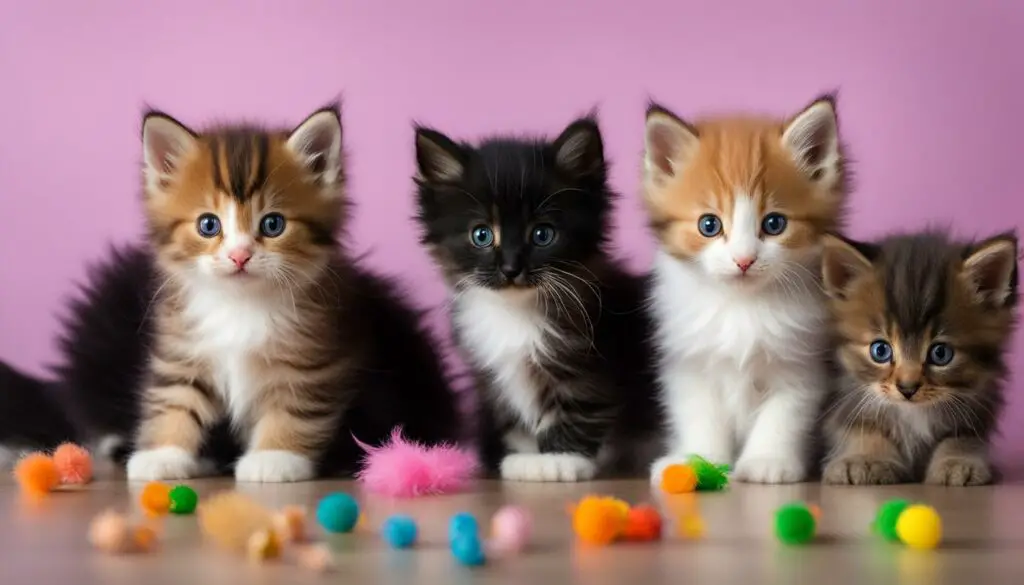
Proper Litter Box Maintenance and Hygiene
When it comes to the health and well-being of your 4-week-old kitten, proper litter box maintenance and hygiene are of utmost importance. By ensuring a clean and comfortable environment, you can minimize the risks of litter ingestion and provide a safe space for your kitten to use the litter box.
To keep the litter box clean, it is crucial to regularly empty and clean it. Remove any soiled litter promptly to prevent the buildup of bacteria and odors. Use a non-toxic cleaning solution that is safe for your kitten, avoiding harsh chemicals that may be harmful if ingested. Keeping the litter box clean not only promotes a healthier and more pleasant environment but also encourages your kitten to use the litter box consistently.
Additionally, the location of the litter box is essential for maintaining proper hygiene. Place the litter box in a quiet area away from your kitten’s food and water sources. Cats naturally prefer privacy when using the litter box, so choose a spot that offers seclusion and reduces distractions. This will help your kitten feel more comfortable and secure while using the litter box.
| Proper Litter Box Maintenance | Hygiene Tips |
|---|---|
| Regularly empty and clean the litter box | Use a non-toxic cleaning solution |
| Remove soiled litter promptly | Keep the litter box in a quiet area |
| Refill with fresh litter | Provide a comfortable and private location |
Refilling the litter box with fresh litter is also crucial for maintaining proper hygiene. Kittens have a heightened sense of smell, and using dirty or soiled litter can deter them from using the litter box. Regularly monitor the litter level and add fresh litter as needed to ensure a comfortable and inviting environment for your kitten.
By following these proper litter box maintenance and hygiene practices, you can create a clean and safe space for your 4-week-old kitten. Remember to consult with a veterinarian if you have any concerns about your kitten’s litter box habits or overall health. A vet can provide guidance tailored to your specific situation and help address any issues promptly to ensure the well-being of your furry friend.
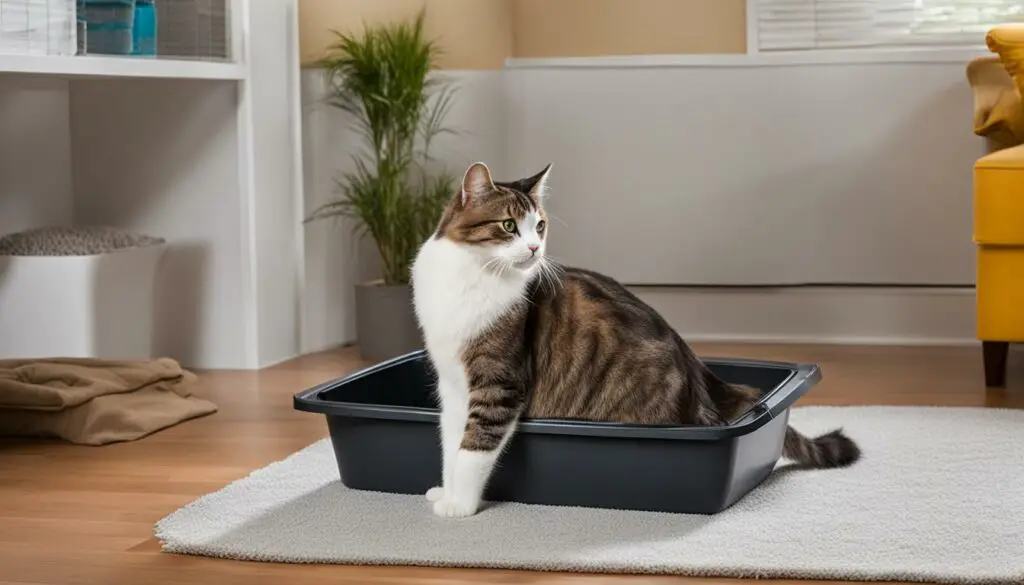
Conclusion
In conclusion, it is crucial to address the dangers of litter consumption in kittens, especially 4-week-old ones. Kittens may eat litter out of curiosity, but it can also be a sign of a more serious underlying issue such as pica. Whether it’s due to curiosity or pica, eating litter can pose serious risks to a kitten’s health, including bowel obstruction.
To minimize these risks, it is important to take appropriate steps. Switching to non-clumping cat litter can help reduce the chances of complications. Monitoring the kitten closely during litter box usage and providing safe alternatives for exploration can also discourage the habit of litter eating.
However, if the litter-eating behavior persists or is accompanied by other concerning symptoms, it is crucial to consult a veterinarian. They can accurately assess the kitten’s overall health and determine if further investigation or treatment is necessary. By prioritizing the kitten’s health and addressing any issues promptly, we can ensure their safety and promote a healthy development.
Remember, precautionary measures, proper litter box maintenance, and regular veterinary care are key to minimizing the risks associated with litter consumption in 4-week-old kittens. Together, we can create a safe and nurturing environment for our feline friends.
FAQ
Why is my 4-week-old kitten eating litter?
There are two main reasons why a kitten may eat litter – curiosity and pica. Curiosity is a natural behavior for kittens as they explore their environment, including the taste of different objects. Pica is a condition where cats have a craving to eat non-food items, which can be a sign of illness or nutritional deficiency.
What are the risks of kittens eating litter?
Eating litter can pose serious risks for kittens, especially clumping cat litter. It can lead to bowel obstruction, causing symptoms such as vomiting, poor appetite, weakness, and dehydration. It is important to avoid clumping cat litter to minimize these complications.
What are the common causes of pica in cats?
Pica in cats, including kittens, can have various underlying causes. It may be due to anemia, caused by factors such as blood parasites or dietary deficiencies. Other possible causes include worms or internal parasites, kidney disease, and bone marrow problems.
How can I address curiosity-driven litter eating in kittens?
To address curiosity-driven litter eating, switch to non-clumping cat litter to reduce risks. Monitor the kitten closely and remove them from the litter box if they attempt to eat the litter. Offer alternative safe objects for exploration, ensure a balanced diet, and schedule regular veterinary check-ups.
How can I identify and treat pica in kittens?
If the kitten’s litter eating behavior is due to pica, it is important to identify the underlying cause through a vet’s evaluation. Treatments may include addressing anemia through blood tests and dietary adjustments. Treating any underlying health conditions or parasites is essential to effectively address the pica behavior.
Why is a veterinary consultation important for kittens eating litter?
Not all litter-eating behavior is harmless, and a vet can accurately assess the kitten’s overall health and determine if further investigation or treatment is necessary. If the kitten shows signs of illness, such as poor appetite, weight loss, weakness, or dehydration, a vet’s opinion is vital.
How can I litter train young kittens?
Introduce kittens to a clean litter box and encourage their use. Avoid clumping litter and supervise their litter box usage. Gently redirect their attention if they attempt to eat the litter during training. Patience, consistency, and positive reinforcement can help establish proper litter habits in kittens.
How can I prevent litter consumption hazards in kittens?
To prevent litter consumption hazards, avoid using clumping litter, keep the litter box clean, and remove any substances that may be tempting for kittens to eat. Provide alternative sources of stimulation and play to prevent boredom that may lead to litter exploration. Regularly monitor the kitten’s health and behavior for early detection of potential issues.
What are safe alternatives to litter for 4-week-old kittens?
Safe alternatives to litter for 4-week-old kittens include puppy pads, shredded newspaper, or specially designed litter for kittens. These alternatives are easy to clean and reduce the risk of intestinal blockages associated with litter consumption.
How can I maintain kitten health and minimize litter consumption risks?
Ensure your kitten receives a well-balanced diet, regular wellness check-ups, and vaccinations to monitor their overall health. By providing a safe and suitable litter box environment, closely monitoring their behavior, and addressing any health concerns promptly, you can minimize the risks associated with litter consumption in 4-week-old kittens.
How can I address litter-eating behavior in young kittens?
Addressing litter-eating behavior in young kittens involves maintaining a clean and comfortable litter box environment, avoiding clumping litter, supervising their litter box usage, and providing alternative sources of stimulation. Consult a veterinarian if the behavior persists or is accompanied by other concerning symptoms.
How can I monitor the growth and development of 4-week-old kittens?
Monitor your 4-week-old kitten’s weight gain, appetite, hydration levels, coat condition, and overall behavior to ensure healthy growth and development. Schedule regular physical examinations and healthcare check-ups to track their progress and address any concerns promptly.
How can I maintain proper litter box maintenance and hygiene?
To maintain proper litter box maintenance and hygiene, regularly empty and clean the litter box, removing any soiled litter promptly. Use a non-toxic cleaning solution that is safe for the kitten. Ensure the litter box is easily accessible and located in a quiet area away from food and water sources.
Source Links
- https://www.thesprucepets.com/cat-eating-litter-4587387
- https://thecatsite.com/threads/5-week-old-kitten-trying-to-litter-train-and-he-is-eating-litter.261550/
- https://www.petful.com/pet-health/why-kitten-eating-cat-litter/

